
Diego Armando Maradona was an Argentine professional football player and manager. Widely regarded as one of the greatest players in the history of the sport, he was one of the two joint winners of the FIFA Player of the 20th Century award. Maradona's vision, passing, ball control, and dribbling skills were combined with his small stature, which gave him a low centre of gravity allowing him to manoeuvre better than most other players. His presence and leadership on the field had a great effect on his team's general performance, while he would often be singled out by the opposition. In addition to his creative abilities, he possessed an eye for goal and was known to be a free kick specialist. A precocious talent, Maradona was given the nickname "El Pibe de Oro", a name that stuck with him throughout his career. He also had a troubled off-field life and was banned in both 1991 and 1994 for abusing drugs.

The Falklands War was a ten-week undeclared war between Argentina and the United Kingdom in 1982 over two British dependent territories in the South Atlantic: the Falkland Islands and its territorial dependency, South Georgia and the South Sandwich Islands.

South America is a continent entirely in the Western Hemisphere and mostly in the Southern Hemisphere, with a relatively small portion in the Northern Hemisphere. It can also be described as the southern subregion of a single continent called America. The reference to South America instead of other cultural or geographical regions has increased in recent decades due to changing geopolitical dynamics.

Patagonia refers to a geographical region that encompasses the southern end of South America, governed by Argentina and Chile. The region comprises the southern section of the Andes Mountains, lakes, fjords, and glaciers in the west and deserts, tablelands and steppes to the east. Patagonia is bounded by the Pacific Ocean on the west, the Atlantic Ocean to the east, and many bodies of water that connect them, such as the Strait of Magellan, the Beagle Channel, and the Drake Passage to the south.
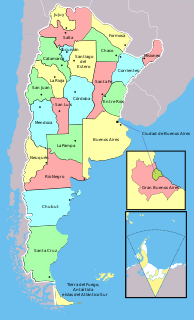
Argentina is subdivided into twenty-three provinces and the autonomous city of Buenos Aires, which is the federal capital of the nation as decided by the Argentine Congress. The provinces and the capital have their own constitutions, but exist under a federal system.
Copa América or CONMEBOL Copa América, known until 1975 as the South American Football Championship, is the top men's football tournament contested among national teams from South America. It is the oldest still-running continental football competition, as well as the third most watched in the world. The competition determines the champions of South America. Since the 1990s, teams from North America and Asia have also been invited to compete.
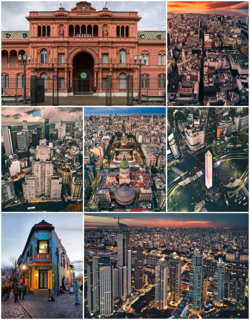
Buenos Aires, officially the Autonomous City of Buenos Aires, is the capital and largest city of Argentina. The city is located on the western shore of the Río de la Plata, on South America's southeastern coast. "Buenos Aires" can be translated as "fair winds" or "good airs", but the former was the meaning intended by the founders in the 16th century, by the use of the original name "Real de Nuestra Señora Santa María del Buen Ayre", named after the Madonna of Bonaria in Sardinia, Italy.

The Dirty War is the name used by the military junta or civic-military dictatorship of Argentina for the period of state terrorism in Argentina from 1974 to 1983 as a part of Operation Condor, during which military and security forces and right-wing death squads in the form of the Argentine Anticommunist Alliance hunted down any political dissidents and anyone believed to be associated with socialism, left-wing Peronism, or the Montoneros movement.
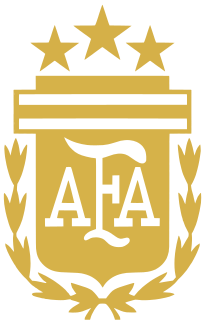
The Argentina national football team represents Argentina in men's international football and is administered by the Argentine Football Association, the governing body for football in Argentina. Argentina's home stadium is Estadio Monumental Antonio Vespucio Liberti in Buenos Aires.
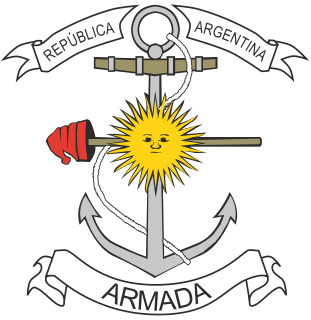
The Argentine Navy is the navy of Argentina. It is one of the three branches of the Armed Forces of the Argentine Republic, together with the Army and the Air Force.

Alberto Ángel Fernández is an Argentine politician, lawyer and professor, serving as president of Argentina since 2019.

The Argentine Football Association is the governing body of football in Argentina based in Buenos Aires. It organises the main divisions of Argentine league system, including domestic cups Copa Argentina and Supercopa Argentina. The body also manages all the Argentina national teams, including the Senior, U-20, U-17, U-15, Olympic and women's squads. Secondly, it also organizes the women's, children, youth, futsal, and other local leagues.

Club Atlético River Plate, commonly known as River Plate, is an Argentine professional sports club based in the Núñez neighborhood of Buenos Aires. Founded in 1901, the club is named after the English name for the city's estuary, Río de la Plata. Although many sports are practiced at the club, River Plate is best known for its professional football team, which has won Argentina's Primera División championship a record of 37 times, its latest title in 2021. Domestic achievements also include 14 national cups, with the 2021 Trofeo de Campeones as the most recent, making River Plate the country's most successful team in domestic competitions with a total of 49 top-division titles.

The Primera División (Spanish pronunciation: [pɾiˈmeɾa ðiβiˈsjon];, named Torneo Socios.com since 2021 for sponsorship reasons, is a professional football league in Argentina, organised by the Argentine Football Association.

Cristina Elisabet Fernández de Kirchner, often referred to by her initials CFK, is an Argentine lawyer and politician who is serving as the 37th Vice President of Argentina since 2019. She also previously served as the President of Argentina from 2007 to 2015 and the first lady during the tenure of her husband, Néstor Kirchner. She was the second woman to have held the Argentine presidency, the first directly elected female president, and the first woman re-elected to the office. Ideologically, she identifies herself as a Peronist and a progressive, with her political approach called Kirchnerism.

The National Reorganization Process was the military dictatorship that ruled Argentina from 1976 to 1983. In Argentina it is often known simply as última junta militar, última dictadura militar or última dictadura cívico-militar, because there have been several in the country's history.

The Copa Argentina, officially known as the "Copa Argentina AXION energy" due to sponsorship reasons, is an official football cup competition organized by the Argentine Football Association (AFA), with the aim of qualifying one club to the Copa Libertadores.

Argentina, officially the Argentine Republic, is a country in the southern half of South America. Argentina covers an area of 2,780,400 km2 (1,073,500 sq mi), making it the largest Spanish-speaking nation in the world by area. It is the second-largest country in South America after Brazil, the fourth-largest country in the Americas, and the eighth-largest country in the world. It shares the bulk of the Southern Cone with Chile to the west, and is also bordered by Bolivia and Paraguay to the north, Brazil to the northeast, Uruguay and the South Atlantic Ocean to the east, and the Drake Passage to the south. Argentina is a federal state subdivided into twenty-three provinces, and one autonomous city, which is the federal capital and largest city of the nation, Buenos Aires. The provinces and the capital have their own constitutions, but exist under a federal system. Argentina claims sovereignty over a part of Antarctica, the Falkland Islands and South Georgia and the South Sandwich Islands.

Argentines (also known as Argentinians or Argentineans; in Spanish argentinos or argentinas are people identified with the country of Argentina. This connection may be residential, legal, historical or cultural. For most Argentines, several of these connections exist and are collectively the source of their being Argentine.
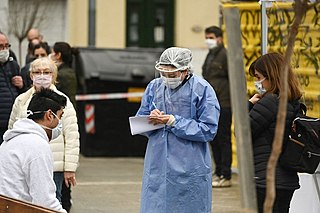
The COVID-19 pandemic in Argentina is part of the worldwide pandemic of coronavirus disease 2019 caused by severe acute respiratory syndrome coronavirus 2. On 3 March 2020, the virus was confirmed to have spread to Argentina. As of 2 January 2022, a total of 5,674,428 people were confirmed to have been infected, and 117,181 people were known to have died because of the virus. On 7 March 2020, the Ministry of Health confirmed the country's first documented death, a 64-year-old man who had travelled to Paris, France, who also had other health conditions; the case was only confirmed as positive after the patient's demise.
















